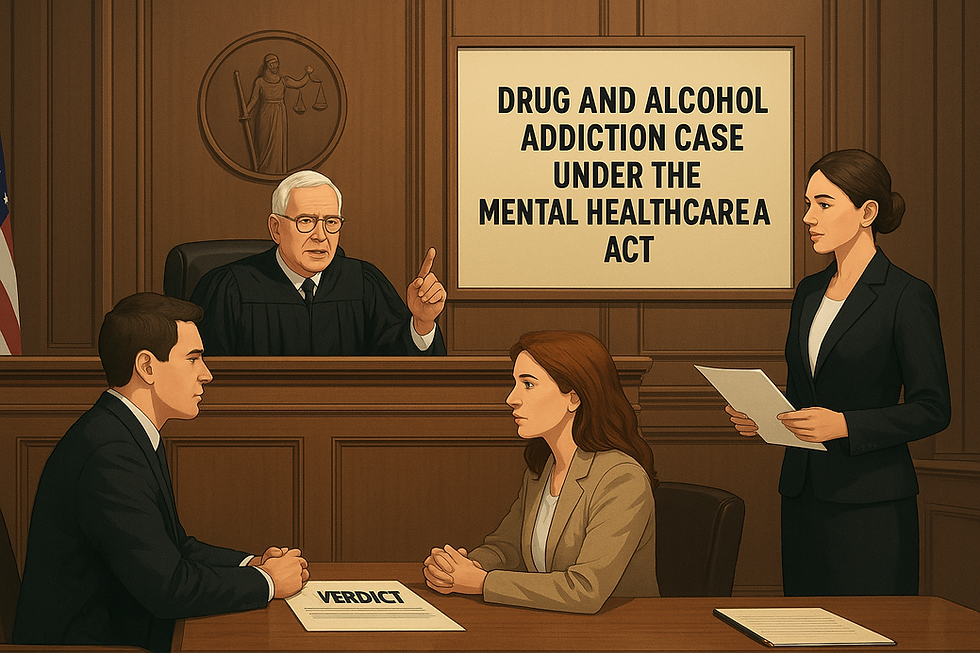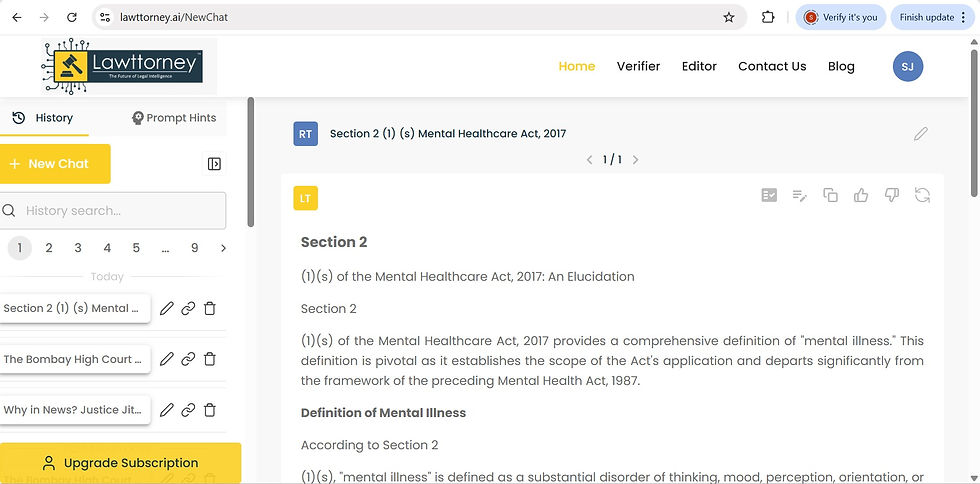Bombay HC: Accused Addicted to Liquor or Drugs Must Be Treated Under Mental Healthcare Act
- Lawttorney.ai

- Oct 28, 2025
- 3 min read
Case Title: Pramod Wamanrao Dhule v. The State of Maharashtra (Neutral Citation: 2025:BHC-AUG:27564).
Introduction:
The Bombay High Court has underscored the necessity of treating accused individuals suffering from alcohol and drug addiction as mentally ill, advocating for their rehabilitation over their release on bail to ensure societal safety, in a significant ruling under the Mental Healthcare Act. While presiding over a bail application in the case of Pramod Wamanrao Dhule v. The State of Maharashtra, a single-judge bench of Justice Sanjay A. Deshmukh delivered the landmark judgement.
The court was hearing a bail plea under Section 483 of the Bharatiya Nagarik Suraksha Sanhita, 2023, filed by a man accused of murdering his wife, allegedly under the influence of alcohol. The charges against the applicant included Sections 302, 304, 498(A), and 323 of the Indian Penal Code, 1860.

Factual Background:
A former CRPF personnel, the applicant, was reportedly terminated from his service due to his alcohol addiction. When she could not serve him a meal on demand, the applicant, in an inebriated state, brutally assaulted his wife with fists and kicks. The assault, witnessed by their two children, led to her death three days later.
Court's Reasoning and Interpretation:
Justice Deshmukh's judgement centred on the interpretation of the Mental Healthcare Act, 2017. The court held that addiction to illicit liquor or prohibited drugs falls under the definition of "mental illness" as defined in Section 2 (1)(s) of the Act, which includes "mental conditions associated with the abuse of alcohol and drugs."

The court observed that addiction can create an "irresistible impulse", a state where an individual, while understanding the nature of their actions, is unable to resist the urge to act due to their mental condition. The bench opined that releasing such individuals on bail without proper treatment would pose a significant threat to society, as they are likely to commit further offences.
The court also expressed concern over what it termed a "drugs war" against the country, with neighbouring nations supplying illicit substances to the younger generation. It noted that medical examinations of arrested individuals are often conducted as a mere formality rather than a thorough psychiatric evaluation.
Key Directives Issued by the Bombay High Court:
The High Court issued a series of comprehensive directives for statewide implementation in Maharashtra by moving beyond the individual case:
Compulsory Psychiatric Evaluation: Any accused person who appears to be addicted to liquor or drugs undergoes a psychiatric examination; all trial and remand courts are now required to ensure this.
Government Rehabilitation: If an accused is diagnosed with a mental illness due to addiction, they must be sent to a government rehabilitation centre for treatment until they have fully recovered. The court specified that outpatient treatment would not suffice and that private rehabilitation is often too costly.
Authorities' Role: Investigating agencies, jail authorities and Police officers are directed to facilitate the medical examination and treatment of such individuals who are addicted.
Awareness Programmes: The Maharashtra State Legal Services Authority (MSLSA) has been directed to organize awareness programmes through District and Taluka Legal Services Authorities to change the societal mindset from condemnation to empathy and sympathy for those suffering from addiction.
Conclusion – A Shift Towards a Reformative Approach:
This landmark judgement redefines the criminal justice approach toward addiction, recognizing it as a mental health issue rather than a moral failing. By prioritizing rehabilitation over retribution, the court has paved the way for a more humane, reformative legal framework, where justice and compassion coexist. The balance between community safety and individual rights demonstrates a progressive interpretation of criminal law. With Lawttorney, users can seamlessly explore such transformative judgements, analyze mental health jurisprudence, and access relevant case laws, statutory provisions, and psychiatric law references in one place. It empowers legal minds to understand the evolving intersection of law, psychology, and human rights.
“Empowering Legal Minds to See Beyond the Crime.”
Empower Your Legal Practice with AI – Join Our Free Webinar!
Are you a legal professional looking to boost your efficiency and stay ahead in a competitive field? Discover the power of Lawttorney.AI – the cutting-edge tool designed to streamline legal research, automate tasks, and enhance productivity.
👉 Don't miss out! Reserve your spot in our FREE webinar and experience the future of legal practice today. Register Now




Comments